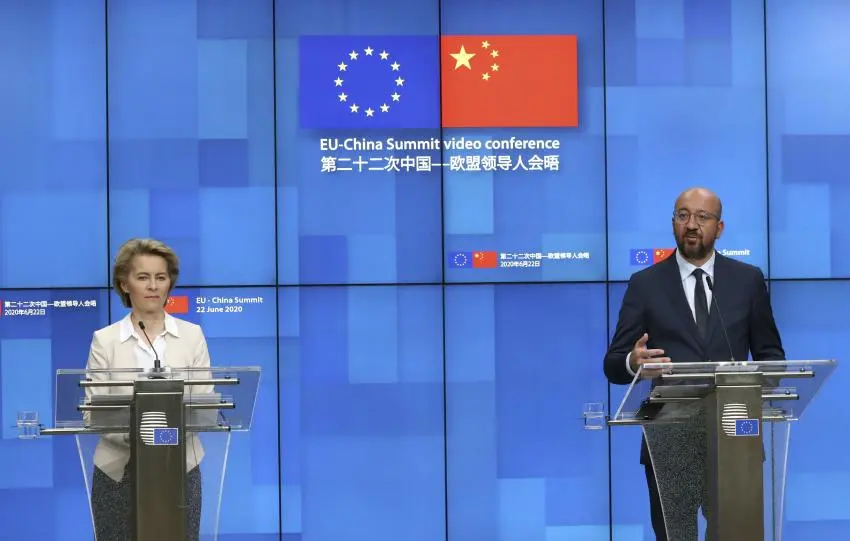European Council Conclusions on China – Balancing Cooperation and De-risking
European Council Conclusions on China | The European Council recently released its conclusions on China, focusing on the delicate balance between cooperation and de-risking. This article explores the key highlights of the European Council’s stance on China and its implications for students preparing for government exams, particularly those aspiring to positions in teaching, policing, banking, railways, defense, and civil services such as PSCS to IAS.
The European Council acknowledges the importance of a constructive relationship with China. It recognizes the potential for cooperation in areas such as climate change, trade, and global governance. Efforts will be made to deepen engagement with China while safeguarding European interests and values.
Recognizing the need to address systemic challenges, the European Council highlights concerns over human rights issues, including the situation in Xinjiang and Tibet. It emphasizes the importance of protecting fundamental freedoms and promoting the rule of law in dealings with China.
The European Council seeks a level playing field in economic relations with China. It emphasizes the need for fair competition, reciprocal market access, and the protection of intellectual property rights. Efforts will be made to address trade imbalances and ensure a more balanced economic partnership.

Why this News is Important:
European Council Conclusions on China | Understanding the European Council’s position on China is crucial for students preparing for government exams. It helps them comprehend the complexities of international relations and equips them with the knowledge to make informed decisions regarding policies, diplomacy, and trade.
This news is relevant to multiple exam topics, including international relations, foreign policy, trade, human rights, and technological advancements. It provides valuable insights into current affairs that are likely to feature in exams for positions such as teachers, police officers, banking professionals, railway employees, defense personnel, and civil servants.
Historical Context:
European Council Conclusions on China | The European Union and China have maintained a complex relationship characterized by cooperation and challenges. Over the years, economic ties have strengthened, and China has become a significant trading partner for the EU. However, concerns regarding human rights violations, market access, and unfair trade practices have also emerged, prompting the EU to adopt a more balanced approach toward China.
Key Takeaways from the European Council Conclusions on China:
| Takeaway No. | Key Takeaway |
|---|---|
| 1 | The European Council aims to balance cooperation and de-risking in its relationship with China. |
| 2 | Human rights concerns, including the situation in Xinjiang and Tibet, are important considerations in EU-China relations. |
| 3 | Fair competition, reciprocal market access, and intellectual property protection are key priorities for the European Council in its economic relations with China. |
| 4 | Technology, connectivity, and cybersecurity are critical areas of cooperation and potential conflict between the EU and China. Efforts will be made to ensure a secure and open digital environment. |
| 5 | The European Council emphasizes the significance of upholding and strengthening the international rules-based order through multilateral cooperation and the reform of global institutions. |
Conclusion:
The European Council’s conclusions on China highlight the delicate balance between cooperation and de-risking in its relationship with China. For students preparing for government exams, understanding the key highlights and implications of this news is essential. It provides insights into the complexities of international relations, trade, human rights issues, and technological advancements.
By staying informed on current affairs like this, students can enhance their understanding of relevant exam topics and make informed decisions in their future roles as teachers, police officers, banking professionals, railway employees, defense personnel, and civil servants.
Important FAQs for Students from this News
Q1: What is the significance of the European Council’s conclusions on China?
A1: The European Council’s conclusions on China are significant as they provide insights into the EU’s approach towards balancing cooperation and de-risking in its relationship with China. This information is relevant for understanding international relations and foreign policy.
Q2: What are the key areas of concern highlighted by the European Council regarding China?
A2: The European Council has raised concerns over human rights issues, economic relations, technology, connectivity, cybersecurity, and the need to strengthen the international rules-based order.
Q3: How does this news impact students preparing for government exams?
A3: This news is relevant to various exam topics such as international relations, foreign policy, trade, human rights, and technological advancements. It helps students understand current affairs and equips them with the knowledge to answer questions related to these topics in their exams.
Q4: What are the historical factors that have shaped EU-China relations?
A4: EU-China relations have evolved over time, with economic ties strengthening while concerns regarding human rights violations, market access, and unfair trade practices have emerged. This historical context is essential for understanding the dynamics of their relationship.
Q5: How can students make use of this news article for their exam preparation?
A5: Students can utilize this news article to enhance their understanding of relevant exam topics, gain insights into international relations, and prepare for questions related to the European Council’s conclusions on China.
Some Important Current Affairs Links

















